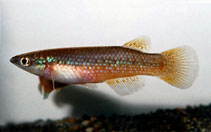Pachypanchax patriciae Loiselle, 2006
Pictures | Google imagePachypanchax patriciae
Female Picture by Loiselle, P.V.
Classification / Names Common names | Synonyms | Catalog of Fishes(genus, species) | ITIS | CoL | WoRMS | Cloffa
Etymology: Pachypanchax: Greek, pachys = fat + Panchax, a word created by Meinken in 1932 word created by Meinken in 1932; patriciae: Named for Patricia Yazgi in recognition of her support in the documentation and conservation of the Malagasy freshwater ichthyofauna (Ref. 57724).
Eponymy: Patricia Griffith Yazgi (1946–2006) was honoured in recognition of her support in the documentation and conservation of Malagasy freshwater fish. She ran the conservation charity, ‘Friends of Fishes’. (Ref. 128868), visit book page.
Environment: milieu / climate zone / depth range / distribution range Ecology
Distribution Territories | FAO areas | Ecosystems | Occurrences | Point map | Introductions | Faunafri
Size / Weight / Age
Life cycle and mating behavior Maturity | Reproduction | Spawning | Eggs | Fecundity | Larvae
Main reference
Upload your references | References | Coordinator : Costa, Wilson J.E.M. | Collaborators
IUCN Red List Status (Ref. 130435: Version 2025-2)
CITES
Threat to humans
Human uses
More information
Ecology
Growth parameters
Max. ages / sizes
Length-weight rel.
Length-length rel.
Length-frequencies
Mass conversion
Recruitment
Abundance
Reproduction
Maturity
Maturity/Gills rel.
Fecundity
Spawning
Spawning aggregations
Eggs
Egg development
Larvae
Larval dynamics
Gill area
Brain
Otolith
Body composition
Nutrients
Oxygen consumption
Swimming type
Swimming speed
Visual pigments
Fish sound
Diseases & Parasites
Toxicity (LC50s)
Genome
Genetics
Heterozygosity
Heritability
Genetic Diversity
Aquaculture systems
Aquaculture profiles
Strains
Ciguatera cases
Stamps, coins, misc.
Tools
Special reports
Download XML



